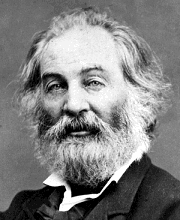Jabberwocky by Lewis Carroll
Lewis Carroll's Jabberwocky appeared in the novel Through the Looking Glass, and What Alice Found There, his follow-up to Alice's Adventures in Wonderland. The poem is proof of a couple of things: 1) a poem doesn't have to make sense to be enjoyable; and 2) they had mind-altering drugs in Victorian England. After the poem I've included an excerpt from Through the Looking Glass in which the Humpty Dumpty(!) explains parts of the poem to Alice. It gives you a sense of Carroll's whimsical reasoning.
Jabberwocky
'Twas brillig, and the slithy toves
Did gyre and gimble in the wabe:
All mimsy were the borogoves,
And the mome raths outgrabe.
"Beware the Jabberwock, my son!
The jaws that bite, the claws that catch!
Beware the Jubjub bird, and shun
The frumious Bandersnatch!"
He took his vorpal sword in hand:
Long time the manxome foe he sought—
So rested he by the Tumtum tree,
And stood awhile in thought.
And, as in uffish thought he stood,
The Jabberwock, with eyes of flame,
Came whiffling through the tulgey wood,
And burbled as it came!
One, two! One, two! And through and through
The vorpal blade went snicker-snack!
He left it dead, and with its head
He went galumphing back.
"And hast thou slain the Jabberwock?
Come to my arms, my beamish boy!
O frabjous day! Callooh! Callay!"
He chortled in his joy.
'Twas brillig, and the slithy toves
Did gyre and gimble in the wabe:
All mimsy were the borogoves,
And the mome raths outgrabe.
From Through the Looking Glass:
'You seem very clever at explaining words, Sir' said Alice. 'Would you kindly tell me the meaning of the poem called "Jabberwocky"?'
'Let's hear it,' said Humpty Dumpty. 'I can explain all the poems that ever were invented just yet.'
Alice remarked thoughtfully: 'and what are "toves"?'
'Well, "toves" are something like badgers - they're something like lizards - and they're something like corkscrews.'
'They must be very curious-looking creatures.'
'They are that,' said Humpty Dumpty: 'also they make their nests under sundials - also they live on cheese.'
 Lewis Carroll was born is Cheshire (like the cat), England in 1832. He excelled at writing, mathematics, and photography. One of his favorote photography subjects was a girl named Alice Lidell, daughter of the Dean at Christ's Curch College, Oxford. She was the basis for Alice in Carroll's children's novels Alice's Adventures in Wonderland and Through the Looking Glass.
Lewis Carroll was born is Cheshire (like the cat), England in 1832. He excelled at writing, mathematics, and photography. One of his favorote photography subjects was a girl named Alice Lidell, daughter of the Dean at Christ's Curch College, Oxford. She was the basis for Alice in Carroll's children's novels Alice's Adventures in Wonderland and Through the Looking Glass.
Jabberwocky
'Twas brillig, and the slithy toves
Did gyre and gimble in the wabe:
All mimsy were the borogoves,
And the mome raths outgrabe.
"Beware the Jabberwock, my son!
The jaws that bite, the claws that catch!
Beware the Jubjub bird, and shun
The frumious Bandersnatch!"
He took his vorpal sword in hand:
Long time the manxome foe he sought—
So rested he by the Tumtum tree,
And stood awhile in thought.
And, as in uffish thought he stood,
The Jabberwock, with eyes of flame,
Came whiffling through the tulgey wood,
And burbled as it came!
One, two! One, two! And through and through
The vorpal blade went snicker-snack!
He left it dead, and with its head
He went galumphing back.
"And hast thou slain the Jabberwock?
Come to my arms, my beamish boy!
O frabjous day! Callooh! Callay!"
He chortled in his joy.
'Twas brillig, and the slithy toves
Did gyre and gimble in the wabe:
All mimsy were the borogoves,
And the mome raths outgrabe.
From Through the Looking Glass:
'You seem very clever at explaining words, Sir' said Alice. 'Would you kindly tell me the meaning of the poem called "Jabberwocky"?'
'Let's hear it,' said Humpty Dumpty. 'I can explain all the poems that ever were invented just yet.'
Alice remarked thoughtfully: 'and what are "toves"?'
'Well, "toves" are something like badgers - they're something like lizards - and they're something like corkscrews.'
'They must be very curious-looking creatures.'
'They are that,' said Humpty Dumpty: 'also they make their nests under sundials - also they live on cheese.'
 Lewis Carroll was born is Cheshire (like the cat), England in 1832. He excelled at writing, mathematics, and photography. One of his favorote photography subjects was a girl named Alice Lidell, daughter of the Dean at Christ's Curch College, Oxford. She was the basis for Alice in Carroll's children's novels Alice's Adventures in Wonderland and Through the Looking Glass.
Lewis Carroll was born is Cheshire (like the cat), England in 1832. He excelled at writing, mathematics, and photography. One of his favorote photography subjects was a girl named Alice Lidell, daughter of the Dean at Christ's Curch College, Oxford. She was the basis for Alice in Carroll's children's novels Alice's Adventures in Wonderland and Through the Looking Glass.

 Dylan Thomas
Dylan Thomas 
